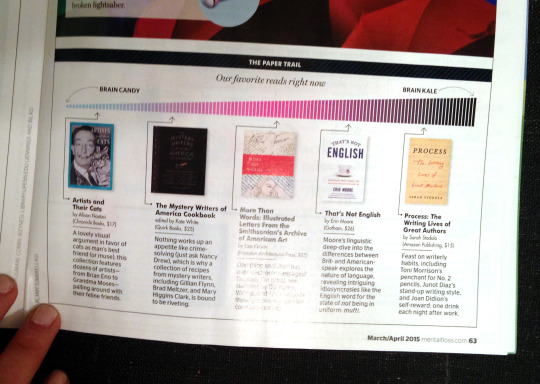Photo

My desk, where I write when I'm not on the couch.
6 notes
·
View notes
Quote
Had he not warned me when I forgot my own notebook that the ability to make a note when something came to mind was the difference between being able to write and not being able to write?
Joan Didion in The Year of Magical Thinking
4 notes
·
View notes
Text
BC: Technology. Did it destroy writing or did it help writing?
SS: I really like writing on a computer. I really like editing as I go.
BC: Do you save drafts or do you just keep revising?
SS: I keep revising one draft. But I get to a certain point where I need to see it on paper, so I print it out and I edit it in on the printout and then go back to the file. But I don’t save the file with a new name. Which isn’t precisely true. I do it very occasionally when I feel like the edits are getting out of control and might be misguided.
BC: But, would James Joyce have written on a computer? I don’t know if there’s an answer to that.
SS: Exactly.
From my wonderfully meandering interview with titivil about my book (Process: The Writing Lives of Great Authors) and all kinds of things that are tangentially related to it.
He doesn’t like Joan Didion, but we got past it.
PROCESS: SARAH STODOLA ON WRITER’S BLOCK, TWITTER AND THE FOUR-HOUR RULE
10 notes
·
View notes
Photo

Writing Space in Summer.
0 notes
Text
The Two Kinds of Morning Writer

While researching my book Process: The Writing Lives of Great Authors, one of the most important habits I gauged was the time of day that successful authors get their writing done. Not surprisingly, more writers I studied do their best work in the morning than at any other time.
But I discovered that those with a morning writing schedule fall into one of two further categories: The pajamas contingent and the make-it-seem-like-a-job set. Some writers like to get going the second they wake up, with no time to spare for sartorial distractions, while others find the routine of presenting oneself to the day helpful in making the work seem urgent.
Below are the most compelling examples of each type of morning writer:
Working in Their PJS:
Edith Wharton: The Age of Innocence author became famous for getting down to writing as soon as she woke up, composing her works in bed and dropping the completed sheets of paper on the floor for the help to retrieve and organize. Nice gig if you can get it.
Salman Rushdie: Rushdie makes it out of bed, but he usually sticks to his PJs. “I’ve learned that I need to give [writing] the first energy of the day,” he says, “so before I read the newspaper, before I open the mail, before I phone anyone, often befor I have a shower, I sit in my pajamas at a desk.”
Toni Morrison: The nascent light of a new day, for Morrison, is the signal to start writing. For much of her writing life, she woke as early as 4am and got down to writing until her kids woke up. Then she got them ready for school and finally, herself ready for her full-time editorial job.
“Getting Ready for Work”
Richard Price: For Price, the writing comes easier if he frames it like a day job. “I go off to work as if I had a clock to punch; at the end of the day I come home as if I had just gotten off the commuter train,” he says.
Joan Didion: She has spoken of dreading the act of getting down to writing. In Didion’s routine, then, breakfast is a time to psych oneself up to head into the office. It’s a much-needed buffer between waking up and facing the task at hand.
Virginia Woolf: Woolf and her husband made a point of breakfasting together for an hour or so every morning,then started the work day by retreating to their respective writing rooms.
#writing#writing tips#creative writing#literature#writers#joan didion#salman rushdie#toni morrison#richard price#virginia woolf
2 notes
·
View notes
Photo

The appearance of Spanish fluency (thanks to a translator at Chile’s El Mercurio newspaper). All my years of Spanish tutors finally pays off?
Get Process: The Writing Lives of Great Authors
1 note
·
View note
Quote
I think one of the best rules for prose-writing today is to write as far opposite from contemporary prose as possible.
Jack Kerouac, in his notebook, 1949
1 note
·
View note
Quote
It is always a necessity to me that the note of inevitableness should be sounded at the very opening of my tale.
Edith Wharton, as quoted in Process: The Writing Lives of Great Authors.
0 notes
Photo

Thank you @mental_flossr for making mine the brainiest one! (Print Only)
Process is available here: http://www.amazon.com/Process-Writing-Lives-Great-Authors/dp/1477801081
2 notes
·
View notes
Quote
Playing Monopoly—which so often begins with cheerful ambition and devolves, after weary hours, into a sighing slog toward a lonely end—seems not entirely unlike writing a book.
The opener of this piece on the author of the new book, the Monopolists, on the New Yorker’s Page Turner blog. (via veblenesquegorge)
3 notes
·
View notes
Quote
By the time most writers just begin to harness their talent, F. Scott Fitzgerald, at age 28, had already published four books, among them
The Beautiful and the Damned and
The Great Gatsby. All were written, it seemed, in the spare moments between cocktails.
From Process: The Writing Lives of Great Authors
6 notes
·
View notes
Photo

10 Surprising Facts About Famous Writers from Process: The Writing Lives of Great Authors, in Mental Floss.
#writers#virginia woolf#jack kerouac#process book#process: the writing lives of great authors#novels#literature#fun facts#toni morrison#david foster wallace
10 notes
·
View notes
Quote
When I was younger, I would write with a lot more ease than I do now, but what I wrote would require a great deal more rewriting. Now I write much more slowly and I revise a lot as I go. I find that when I've got a bit done, it seems to require less revision than it used to.
Salman Rushdie, as quoted in Process: The Writing Lives of Great Authors.
2 notes
·
View notes
Text
George Orwell, as quoted in Process: The Writing Lives of Great Authors:
"One can write nothing readable unless one constantly struggles to efface one's personality."
0 notes
Text
"Chandler wrote the kind of guy that he wanted to be, Hammett wrote the kind of guy that he was afraid he was."
—James Ellroy
452 notes
·
View notes
Text
My Process in Writing 'Process'
Dig Boston interviewed me this week about my own process in writing my new book, Process: The Writing Lives of Great Authors. I say a lot of stuff like this:
"It turns out that I’m super-regimented in the face of a serious deadline like this one, even though the hysteria and panic linger close to the surface."
Q&A: The Process Behind ‘Process’ (Dig Boston)
2 notes
·
View notes
Photo

Micilin took some sweet photos of my extremities at my book party, Part I.
(Process: The Writing Lives of Great Authors is now available!)
#writers#books#Books#process book#process: the writing lives of great authors#writing process#writing habits#writing tips
4 notes
·
View notes